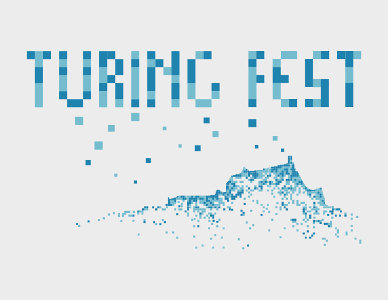
I was delighted to attend Turing Fest in Edinburgh on Thursday with some colleagues, and it was a great event that brought some of the best and brightest in the digital world together.
Throughout the day, there was a range of speakers giving 30-minute talks on their area of expertise, with two different “tracks” (stages) for marketing and tech-related content.
It was fascinating to get some expert insight into the state of the web today, and how best to move forward in producing websites, content and brands that can prosper in an ever more competitive market.
There were four key take-aways for me from what I saw, so here’s what I learned:
Google is a friend and a foe
Rand Fishkin of Moz titled his seminar as “How to stop Google’s Trojan horsing of the web”, and in it he detailed many ways in which the search giant was taking website content and using it as their own – all in the name of a better “user experience”. The findings were quite alarming, and it’s part of a growing trend that I’ve talked about before of Google being too overbearing in its’ position of industry leader.
But despite this, there’s still lots more reason to be on Google’s good side. Fishkin’s talk included updated stats on search market share, and between plain Google searches, Google Image searches and YouTube results – there’s over 80% of results being served by the company.
Another interesting talk was Aleyda Solis’ about the mobile-first world, with Google moving slowly towards an index based around mobile experience, perhaps starting next year. There the key was moving to responsive design for best results, but making sure that the site is actually mobile optimised rather than just displaying correctly. These are all areas where Google is definitely helping the web, rather than hurting it.
And of course, there was Juan Felipe Rincon from Google themselves talking about the important work they’re doing in building a more secure web by working with webmasters that are a bit out of the loop. This shows there is still a lot of positive thing coming from the company, despite some of their more hawkish practices.
Things aren’t changing as quickly as they have been
A key topic that came up time after time was that of voice search, particularly Amazon’s Alexa, and whether that will play a big role in the way we use the internet in future. The current consensus from speakers, though, was it would take time. Wil Reynolds suggested that Amazon might eventually send all Prime customers an Echo Dot to help boost the uptake, but that might be a while off yet.
Another area that hasn’t seemed to change in recent times is the percentage of users’ search queries being solved in a particular way. On the whole PPC results are clicked in only 3-4% of searches, organic results are clicked about 40-45% of the time and the user doesn’t click for the rest. This has stayed constant over the last couple of years, despite PPC revenue growth and the increase in featured snippets being used in SERPs.
Distributing efforts can add up to real results
Although I didn’t see too much from the tech track of Turing Fest, one of the talks I went to was from Adrian Mouat about the rise of microservices – and how splitting a web application into different features and keeping them as separate components can make the whole app more stable and easy to develop for. Another interesting idea that came out of it was that of “two pizza” teams, as used by Amazon. This is the idea that if your team can’t be fed by two pizzas, it’s likely too big to be able to communicate on a single task.
This was also echoed to an extent by Lisa Myers’ talk, where she talked about splitting the team at her SEO agency into teams focussed on areas such as outreach to make sure they specialise in what they’re good at.
Treat people like people
As strange as it might sound, this was a key theme to come from many talks. I guess for too long people have been trying to “game” the system, particularly when it comes to areas like SEO, and have failed to realise that gaining traction and business is still all about creating connections with people.
Laura Crimmons’ talk was especially geared at this, with some quick and simple rules to follow on using knowledge and planning to help make good connections with people that provide good results.
On the whole it was fantastic to be a part of the Turing Fest event and I really hope to be able to make the trip again next year!